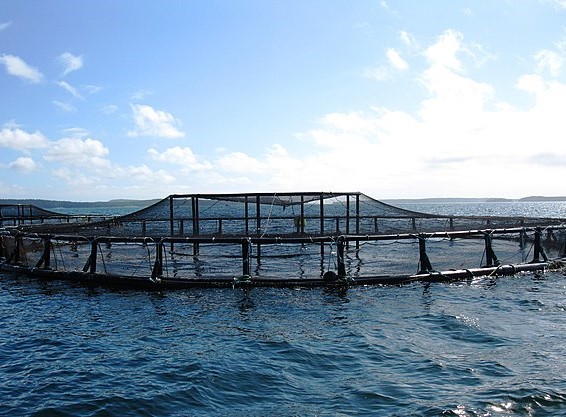JUNE 9, 2023, WASHINGTON, D.C.— This week, U.S. Senators Roger Wicker (R-Miss.) and Brian Schatz (D-Hawaii) reintroduced the Advancing the Quality and Understanding of American Aquaculture (AQUAA) Act to ease the way for corporations trying to construct industrial offshore aquaculture facilities.
Fisherfolk, business leaders, community advocates and many others have repeatedly blocked this legislation from passing in recent years, pointing out that industrial aquaculture pollutes marine ecosystems and puts seafood production in the hands of large corporations, thus harming local fishing communities and coastal economies that depend on healthy oceans and community-based seafood systems. Facilities already poised for construction off the coasts of Florida, Southern California and New England have faced strong bipartisan opposition. The AQUAA Act would streamline the process for corporations to develop additional facilities across the country.

In response to the bill’s reintroduction, members of the Don’t Cage Our Oceans Coalition issued the following statements urging Congress and federal leaders to once again reject this attempt to privatize the ocean’s natural resources:
James Mitchell, Legislative Director for Don’t Cage Our Oceans:
“Senators Wicker and Schatz chose to re-introduce their previously failed bill in the middle of Capitol Hill Oceans Week, when our leaders should be redoubling their commitment to protect ocean ecosystems. This bill could effectively turn our shared ocean space into a toilet for factory fish farms, where taxpayer-subsidized corporations would be allowed to grow fish for profit, despite overwhelming public opposition. We are calling on our congressional leaders’ common sense to reject this unwanted and unnecessary development of a dirty and dangerous industry, and protect our sustainable seafood producers who provide access to healthy food for families across the U.S.”
Linda Behnken, Executive Director for the Alaska Longline Fishermen’s Association:
“As fishing men and women, we take great care of the health of our oceans and the communities that depend on them. The AQUAA act will only weaken fishing communities around the United States. Wild fish populations will be put in jeopardy by farmed fish escapements, disease, and the depletion of forage fish for feed. It will only contribute to threats against our coastal economies and marine resources.”
Natalie Parra, Campaign Director for Oceanic Preservation Society:
“For over 20 years, Hawai’i has lived with offshore fish farms in its state waters. They have brought coral reef damage, marine mammal deaths and behavioral changes, and worker safety violations. The AQUAA Act will only exacerbate these problems around our coasts and endanger the health and integrity of our ocean ecosystems.”
Andrew Whitehurst, Water Program Director for Healthy Gulf:
“We are deeply disappointed that Senator Wicker, who represents the people of Mississippi, has opted to re-introduce the bill that will only cause harm to the Gulf of Mexico. There are currently two planned offshore fish farms for the Gulf of Mexico and the people have overwhelmingly opposed them through sign-on letters, rallies, and public comments. Our coastal communities in Florida, Mississippi, and around the Gulf, have experienced red tides, harmful algae blooms and other symptoms of excess nutrients in coastal waters, and understand the additional threat that industrial fish farming brings to the Gulf’s health and the economic stability of those that depend on it .”
Elizabeth Schuster, Government Affairs Rep for Food & Water Watch:
“The AQUAA Act represents another form of control and consolidation of our food system. We have seen the damage land-based factory farms cause to our air, water, and climate while concentrating profits in the hands of a few large corporations. Why would we push these monstrosities offshore where they are out of sight and out of mind? Congress needs to step up and protect public health and our environment, not further consolidate our food system for pure corporate gain.
Brett Tolley, National Program Coordinator for the North American Marine Alliance (NAMA):
“We are led by thousands of small-scale fishing families around the US, whose livelihoods are threatened by the expansion of aquaculture into federal waters and the industrialization of our seafood system that comes along with it. We should not confuse these corporate ventures with small-scale, nearshore aquaculture projects rooted in local communities and economies. This includes native Hawaiian fishponds, as well as appropriately-scaled and values-based shellfish farming, seaweed farming, and aquaponics — these types of projects have tremendous potential to provide food and livelihoods for communities while minimizing impacts to the environment, unlike industrial offshore fish farms, which have caused well-documented ecological and economic problems around the world.”
Niaz Dorry, Executive Director of the National Family Farm Coalition:
“The lobbyists behind the AQUAA Act include Cargill, Sysco, and Merck. These corporations are working from the same playbook that has industrialized our land-based food and agriculture systems, to the rampant detriment of local ecosystems, communities, and small-scale food producers. Despite their attempts at greenwashing, let’s be very clear that the players behind the AQUAA Act are focused on maximizing profits to multinational corporations, not on feeding people, uplifting coastal economies, or protecting our oceans.”
Don’t Cage Our Oceans is a diverse, nation-wide coalition of organizations and businesses fighting offshore fish farming, while uplifting values-based seafood systems led by local communities. Learn more at https://dontcageouroceans.org.
